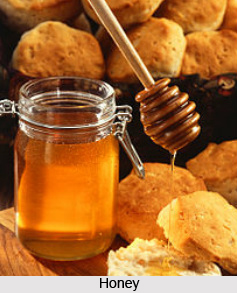 Sweet taste in Ayurveda is primarily related to water element and secondarily to earth element. The sweet taste is predominant in carbohydrates, especially starches, sugars, fats and amino acids. Most of these food are anabolic i.e. body building. It also helps to build the body tissue. So foods with sweet taste are absolutely necessary in the diet of gaunt people who are mainly air type individuals.
Sweet taste in Ayurveda is primarily related to water element and secondarily to earth element. The sweet taste is predominant in carbohydrates, especially starches, sugars, fats and amino acids. Most of these food are anabolic i.e. body building. It also helps to build the body tissue. So foods with sweet taste are absolutely necessary in the diet of gaunt people who are mainly air type individuals.
According to Ayurveda the sweet taste acts quickly on the taste buds and saliva. The nature is cold, heavy and viscous i.e. oily and gelatinous. When sweet taste is used in excess, it has a tendency to clog. The taste is tonifying, stabilizing and pacifying. The sweet taste is therefore remedial for air and fire types who are irritable in nature. The taste might also promote fertility and longevity of an individual. Whenever there is a problem of overweight, mucus congestion, coldness or chills, excessive consumption of sweet food is not recommended Anything watery in nature is anti-fire, so it should be kept in mind that where the fire element is already low, sweets will cause considerable harm that might have short or long term effect.
All staple foods, vegetable oils, nuts, sugars and syrups, dairy products and meat belong to the group of foods having this sweet taste. These are all that provide nourishment if not consumed in excess. The exception to this rule is honey which has slightly drying or astringent taste, which does not increase weight to the same extent as cane or beet sugar or maple syrup do.
Sweets have fattening properties also. They also contribute to mucus formation and thereby congestion and coughs occur. They may be soothing where the disposition is overly excitable. In cases where there is dryness, brittleness and or burning sensations sweets can be turned into lethal for those who have weak fire elements. Therefore sweet foods contribute to lethargy and drowsiness and other symptoms that is caused by excess water and earth, including poor digestion, sweetness of breath, intestinal worms, vomiting, difficulty in breathing, urinary disorders, eye diseases and in extreme cases it causes headaches, diabetes, elephantiasis and tumours.





